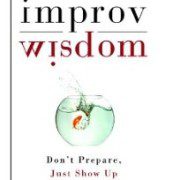Book Review
Improv Wisdom: Don’t Prepare, Just Show Up
By Patricia Ryan Madson
One of my mentors recommends that her clients invest in an improv class to help with sales conversations. When she made that recommendation, I broke into a cold sweat, but I also started to notice how frequently I was hearing that recommendation. If you’d like a touch of improv training without going to a class, read Improv Wisdom: Don’t Prepare, Just Show Up.
For many of us who’ve built a life on out-preparing our competition, the title alone is revolutionary and deeply confrontational. When I was in practice, preparation was the fundamental, non-negotiable step necessary for any shot at prevailing in litigation, and I’d never encourage anyone to skip that. Know your facts cold, develop your arguments and your persuasive analysis, and anticipate what may come up in the course of conversation. To advise otherwise is, in my opinion, catastrophically unwise.
Yes, you must prepare, and…
Prepare, and prepare to go with the flow of what happens once you’re in the act, whether that’s a business meeting, a hearing, or a meeting with a potential client. In my view, preparation and improvisation are two inseparable sides of a coin. Madson writes:
The habit of excessive planning impedes our ability to see what is actually in front of us. The mind that is occupied is missing the present.
What’s “excessive planning”? It varies based on the situation, but in the context of business development, excessive planning is most often manifest in the course of a meeting with a potential client. The potential client is talking, and the listener is anticipating, not listening. “Ah, she mentioned a policy in the employee handbook about appropriate Internet use, and she was fired. I bet there’s a connection. Now, what did I read last week about that? Doesn’t matter, I can simply tell her about general principles and the trend toward…”
Imagine internal dialogue that says instead, “Ah, she mentioned a policy in the employee handbook about appropriate Internet use, and she was fired. What does that mean? How might I be able to help?” That illustrates Madson’s definition of a good improviser:
A good improviser is someone who is awake, not entirely self-focused, and moved by a desire to do something useful and give something back and who acts upon this impulse.
Madson identifies three keys to improv:
- Remain present to the conversation.
- Say yes. By saying yes, you share control and allow for a mutually created approach. “The yes invites us to find out what is right about the situation, what is good about the offer, what is worthy in the proposal.”
- Add something, or develop the conversation in a positive direction. When using yes, we often respond with, “Yes, but.” But contradicts the preceding yes, so try “Yes, and” instead. “I don’t think I have time to deal with this right now.” “Yes, and the great likelihood is that you’re always going to be busy and letting this lie will just allow the problem to grow. Let’s see how we can address this without burdening you too much.”
One of the most impactful ideas is that of bricolage. Bricolage is a French word for “the art of commandeering the materials at hand — what is most obvious — to solve the problem … You start by carefully noticing what is available.” To me, this sums up improv: be present, notice what’s true, accept the facts as they are (say yes), and then add to the situation with what you have at hand. How might you apply bricolage in business?
Madson offers thirteen maxims, with supporting exercises for each. One of my favorite exercises from the book is designed to kick-start activity: “Start anywhere. Identify a project or task that needs to be done. When you put this book down, follow your first thought and begin the job. Do the very first thing that comes to mind. Continue doing what comes next.” If you are a procrastinator, nothing could be wiser.
While you may not become a master improv artist after reading Improv Wisdom, I can promise that applying it will change the way you see and respond to what’s happening in your practice. Even if you never pick up the book or take an improv class, try an experiment and substitute “yes and” for “yes but” for a week. Notice the results, and then decide for yourself which approach is more effective.




Leave a Reply
Want to join the discussion?Feel free to contribute!